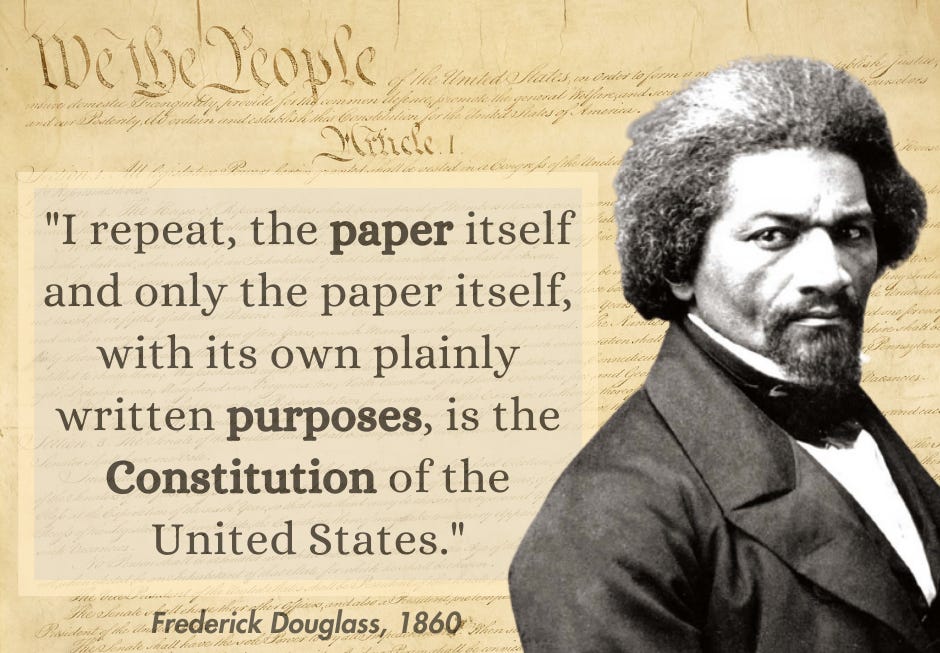Frederick Douglass: The Unconstitutionality of Slavery
A lecture in Glasgow, Scotland, was one of Frederick Douglass’ finest. It’s a masterful exposition in constitutional meaning every Supreme Court justice should read.
Frederick Douglass, “The Unconstitutionality of Slavery,” March 26, 1860:
What is the constitution? It is no vague, indefinite, floating, unsubstantial something, called, according to any man’s fancy, now a weasel and now a whale. But it is something substantial.
It is a plainly written document; not in Hebrew nor in Greek, but in English, beginning with a preamble, fitted out with articles, sections, provisions, and clauses, defining the rights, powers, and duties to be secured, claimed, and exercised under its authority.
It is not even like the British constitution. It is not made up of enactments of parliament, decisions of courts, and the established usages of the government. The American constitution is a written instrument, full and complete in itself.
No court, no congress, no legislature, no combination in the country can add one word to it, or take one word from it. It is a thing in itself; complete in itself; has a character of its own; and it is important that this should be kept in mind as I go on with the discussion. It is a great national enactment, done by the people, and can only be altered, amended, or changed in anyway, shape, or form by the people who enacted it. . . .
Again, it should be borne in mind that the mere text of that constitution—the text and only the text, and not any commentaries or creeds written upon the text—is the constitution of the United States. . . .
I repeat, the paper itself and only the paper itself, with its own plainly written purposes, is the constitution of the United States, and it must stand or fall, flourish or fade, on its own individual and self-declared purpose and object. . . .
There is another law of legal interpretation, which is, that the law is to be understood in the light of the objects sought for by the law, or sought in the law—that is, that the details of the law shall conform to the purpose declared to be sought to be attained by it. What are the objects sought for in the constitution of the American States?
“We, the people of these United States, in order to form a more perfect union, establish justice, ensure domestic tranquillity, provide for the common defence, promote the general welfare, and secure the blessings of liberty to ourselves and our posterity, do ordain and establish this constitution for the United States of America.”
The objects here set forth are six in number. “Union” is one, not slavery; union is named as one of the objects for which the constitution was framed, and it is one that is very excellent; it is quite incompatible with slavery. “Defence” is another; “welfare” is another; “tranquillity” is another; “justice” and “liberty” are the others.
Slavery is not among them; the objects are union, defence, welfare, tranquillity, justice, and liberty.
Let but the American people be true to their own constitution, true to the purposes set forth in that constitution, and we will have no need of a dissolution of the Union—we will have a dissolution of slavery all over that country.
But it has been said that negroes are not included in the benefits sought under this declaration of purposes. Whatever slave-holders may say, I think it comes with ill grace from abolitionists to say the negroes in America are not included in this declaration of purposes. The negroes are not included! Who says this? The constitution does not say they are not included, and how dare any other person, speaking for the constitution, say so?
The constitution says “We the people”; the language is “we the people”; not we the white people, not we the citizens, not we the privileged class, not we the high, not we the low, not we of English extraction, not we of French or of Scotch extraction, but “we the people”; not we the horses, sheep, and swine, and wheelbarrows, but we the human inhabitants; and unless you deny that negroes are people, they are included within the purposes of this government.
They were there, and if we the people are included, negroes are included; they have a right, in the name of the constitution of the United States, to demand their liberty.



